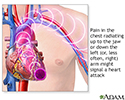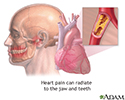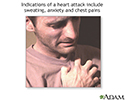Heart attack
Myocardial infarction; MI; Acute MI; ST-elevation myocardial infarction; Non-ST-elevation myocardial infarction; NSTEMI; CAD - heart attack; Coronary artery disease - heart attackMost heart attacks are caused by a blood clot that blocks one of the coronary arteries. The coronary arteries bring blood and oxygen to the heart. If the blood flow is blocked, the heart is starved of oxygen and heart cells die. The medical term for this is myocardial infarction.
The Basics
Self Care
Talking to your MD
Heart attack - Animation
Heart attack
Animation
Heart failure - Animation
Heart failure
Animation
Heart attack symptoms
Symptoms of a heart attack may widely vary, from the classic "elephant on the chest" feeling of crushing pain, to the nausea and heartburn mistaken for indigestion. In some patients, the symptoms may only be sudden fatigue or an oppressive feeling of impending doom.
Heart attack symptoms
illustration
Heart attack symptoms
Symptoms of a possible heart attack include chest pain and pain that radiates down the shoulder and arm. Some people (older adults, people with diabetes, and women) may have little or no chest pain. Or, they may experience unusual symptoms (shortness of breath, fatigue, weakness). Women are more likely than men to have symptoms of nausea, vomiting, back or jaw pain, and shortness of breath with chest pain.
Heart attack symptoms
illustration
Jaw pain and heart attacks
Pain from a heart attack may sometimes radiate to the jaw and teeth. Chest pain is a major symptom of heart attack, but other symptoms such as weakness, shortness of breath, nausea, or vomiting may also occur.
Jaw pain and heart attacks
illustration
Symptoms of heart attack
Symptoms of a heart attack can vary widely and can mimic other conditions such as indigestion or heartburn. The important fact to know is to take all heart attack related symptoms seriously and seek medical help as soon as possible.
Symptoms of heart attack
illustration
Being active after a heart attack
A prescription for physical activity is important after a heart attack. It is important to follow the guidelines for physical activity from your clinical team. Start slowly, and increase the amount of time you exercise gradually.
Being active after a heart attack
illustration
Heart attack symptoms
Symptoms of a heart attack may widely vary, from the classic "elephant on the chest" feeling of crushing pain, to the nausea and heartburn mistaken for indigestion. In some patients, the symptoms may only be sudden fatigue or an oppressive feeling of impending doom.
Heart attack symptoms
illustration
Heart attack symptoms
Symptoms of a possible heart attack include chest pain and pain that radiates down the shoulder and arm. Some people (older adults, people with diabetes, and women) may have little or no chest pain. Or, they may experience unusual symptoms (shortness of breath, fatigue, weakness). Women are more likely than men to have symptoms of nausea, vomiting, back or jaw pain, and shortness of breath with chest pain.
Heart attack symptoms
illustration
Jaw pain and heart attacks
Pain from a heart attack may sometimes radiate to the jaw and teeth. Chest pain is a major symptom of heart attack, but other symptoms such as weakness, shortness of breath, nausea, or vomiting may also occur.
Jaw pain and heart attacks
illustration
Symptoms of heart attack
Symptoms of a heart attack can vary widely and can mimic other conditions such as indigestion or heartburn. The important fact to know is to take all heart attack related symptoms seriously and seek medical help as soon as possible.
Symptoms of heart attack
illustration
Being active after a heart attack
A prescription for physical activity is important after a heart attack. It is important to follow the guidelines for physical activity from your clinical team. Start slowly, and increase the amount of time you exercise gradually.
Being active after a heart attack
illustration
Heart attack
Myocardial infarction; MI; Acute MI; ST-elevation myocardial infarction; Non-ST-elevation myocardial infarction; NSTEMI; CAD - heart attack; Coronary artery disease - heart attackMost heart attacks are caused by a blood clot that blocks one of the coronary arteries. The coronary arteries bring blood and oxygen to the heart. If the blood flow is blocked, the heart is starved of oxygen and heart cells die. The medical term for this is myocardial infarction.
The Basics
Self Care
Talking to your MD
Heart attack
Myocardial infarction; MI; Acute MI; ST-elevation myocardial infarction; Non-ST-elevation myocardial infarction; NSTEMI; CAD - heart attack; Coronary artery disease - heart attackMost heart attacks are caused by a blood clot that blocks one of the coronary arteries. The coronary arteries bring blood and oxygen to the heart. If the blood flow is blocked, the heart is starved of oxygen and heart cells die. The medical term for this is myocardial infarction.
The Basics
Self Care
Talking to your MD
Review Date: 7/14/2024
Reviewed By: Michael A. Chen, MD, PhD, Associate Professor of Medicine, Division of Cardiology, Harborview Medical Center, University of Washington Medical School, Seattle, WA. Also reviewed by David C. Dugdale, MD, Medical Director, Brenda Conaway, Editorial Director, and the A.D.A.M. Editorial team.








